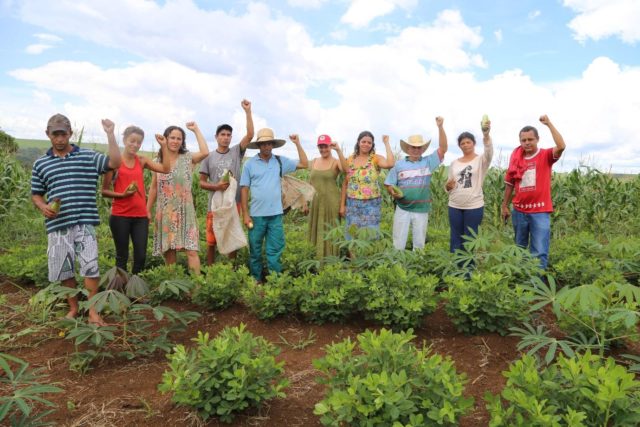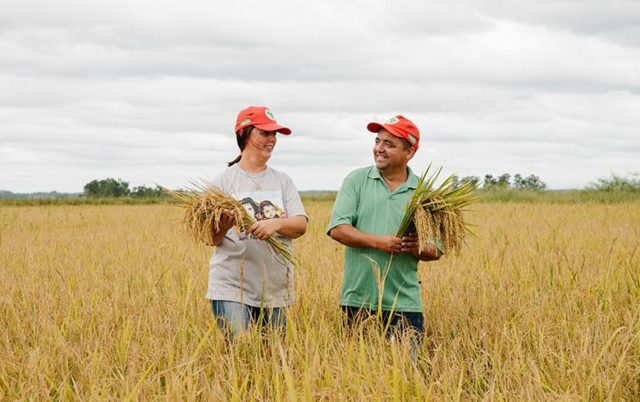By Murilo Mendonça Oliveira de Souza – Extract from Navdanya International Report The Future of Food – Farming with Nature, Cultivating the Future – November 2019
Brazilian agribusiness has established technical and political parameters to create a world-renowned model of agriculture. In Brazil, agribusiness is the result of a historical process enforced on lands through large monocultures and violence against indigenous people, traditional communities and peasants. It expropriated their territories and eliminated their livelihoods.
The agribusiness-based production model has accumulated social and environmental impacts. Its consolidation, which aims to produce commodities, resulted in the expulsion of traditional and peasants’ communities from the countryside to make way for corn, soybean, cotton and sugarcane monocultures. According to data from the 2017 Censo Agropecuário[1], rural establishments with 1,000 hectares or more occupy 47.5% of the country’s land, while farms with size between 100 and 1,000 hectares occupy 32% of the land. This indicates that less than 20% of the land remains for the vast majority of peasants, who represent more than 80% of farmers.
Agribusiness also represents violence against peasant families and indigenous nations. In 2017, 2,307 families were expelled from their lands, 28 peasant were murdered, 27 were tortured, 167 were threatened with death and 1,465 identified as working in slave labour conditions, according to the annual report “Relatório de Conflitos no Campo” of the Brazilian institute Comissão Pastoral da Terra[2].
With the cultivation of transgenic seeds, violence also occurs through contamination of nature, water and our food with pesticides. For over a decade, Brazil has been the largest consumer of pesticides in the world. In 2017 alone, 539.9 thousand tons of pesticide active ingredients were consumed in Brazil, more than 45% referring to Glyphosate. In the first half of 2019, around 240 new pesticides were approved to be used in the country’s fields, many of them banned in Europe and elsewhere [3]. Most part of pesticides which is consumed is related to GMO planting. In 2016, Brazil had 41.9 million hectares of transgenic seeds crops, which makes the country the second largest producer of transgenics in the world[4].
Recent research has shown that a cocktail of 27 different pesticides has been identified in drinking water from 1 in 4 Brazilian municipalities[5]. Similarly, 58% of the analyzed foods (rice, beans, potatoes, corn, and 21 other foods) between 2013 and 2015 contained pesticide residue [6]. Therefore, agribusinesses don’t produce food. They produce commodities. They produce contamination and violence on the people and the environment.
Brazilian family peasants have been responsible for producing the real food consumed in the country. They’re responsible for 70% of beans, 34% of rice, 87% of manioc, 46% of corn, 38% of coffee, 21% of wheat and 60% of milk [7]. This production process is based on peasants and traditional communities. Thus, they represent the social and cultural realities of the Brazilian people, which produces food respecting nature and people. It is also related to the struggle for land, organized by landless rural workers in Brazil, which created new spaces for food production and a large contingent of farmers, ensuring a healthy life for the entire consumption chain.

Landless Camp Dom Tomás Balduino – Photo: Gwatá/Agroecology Brazil
Agroecology is the basis of this diverse and culturally fair production. Agroecological farming, in addition to ensuring healthy food production, also ensures respect for diversity (natural and cultural), respect for indigenous and peasant groups, respect for women and respect for the youth.
Currently, Brazil has approximately 70,000 certified organic producers. Agroecological experiences are increasingly multiplying. Farmers from the Movimento dos Trabalhadores Rurais Sem Terra (Landless Rural Workers Movement – MST) harvested more than 16,000 tons of organic rice in 2019, ensuring healthy food for all[8].

Organic Rice – Photo: Alex Garcia/MST
Agroecology is the only way to produce socially and environmentally healthy food, respecting the culture and the struggle of indigenous peoples, traditional populations and peasants. Agroecology must be understood as a practice, a movement and a science, an articulation that guarantees the production of real food. And it can only be built collectively by peasants.
References
[1] IGBE, CensoAgro 2017, https://censos.ibge.gov.br/agro/2017/resultados-censo-agro-2017.html
[2] CPT Commissão Pastoral da Terra (2018) Conflitos no Campo do Brasil, https://www.cptnacional.org.br/publicacoes-2/destaque/4687-conflitos-no-campo-brasil-2018
[3] Agrotóxico Mata. Campanha Permanente contra os agrotóxicos e pela vida, https://contraosagrotoxicos.org/dados-sobre-agrotoxicos/
[4] ISAA (2017) Brief 53: Global Status of Commercialized Biotech/GM Crops, http://www.isaaa.org/resources/publications/briefs/53/default.asp
[5] Aranha, A., Rocha, L., Publica, Agência de Jornalismo Investigativo, Especial: Por Trás do Alimento, 15/04/2019, https://apublica.org/2019/04/coquetel-com-27-agrotoxicos-foi-achado-na-agua-de-1-em-cada-4-municipios-consulte-o-seu/
[6] ANVISA Agência Nacional de Vigilância Sanitária, Programa de Análise de Resíduos de Agrotóxicos em Alimentos para Relatório das Análises de Amostras Monitoradas no Período de 2013 a 2015, Gerência-Geral de Toxicologia, 22/09/2016, Brasília, http://portal.anvisa.gov.br/documents/219201/2782895/Relat%C3%B3rio+PARA/a6975824-74d6-4b8e-acc3-bf6fdf03cad0?version=1.0
[7] IBGE Istituto Brasileiro de Geografia e Statisticas, https://ww2.ibge.gov.br/home/estatistica/economia/agropecuaria/censoagro/2006_segunda_apuracao/default.shtm
[8] RBA Rete Brasil Atual, MST comemora colheita estimada em 16 mil toneladas de arroz agroecológico, 16/03/2019, https://www.redebrasilatual.com.br/cidadania/2019/03/mst-comemora-colheita-de-16-mil-toneladas-de-arroz-organico/
